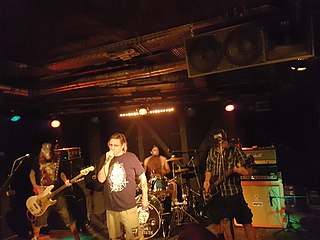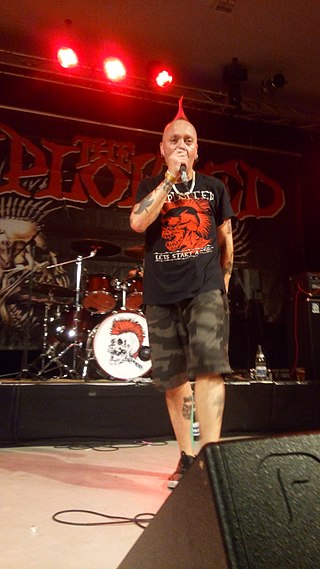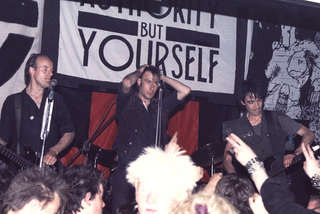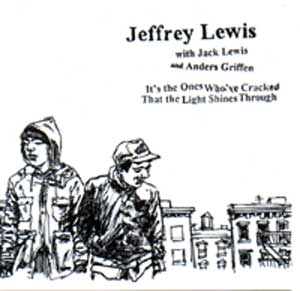Grindcore is an extreme fusion genre of heavy metal and hardcore punk that originated in the mid-1980s, drawing inspiration from abrasive-sounding musical styles, such as thrashcore, crust punk, hardcore punk, extreme metal, and industrial. Grindcore is considered a more noise-filled style of hardcore punk while using hardcore's trademark characteristics such as heavily distorted, down-tuned guitars, grinding overdriven bass, high-speed tempo, blast beats, and vocals which consist of growls, shouts and high-pitched shrieks. Early groups like Napalm Death are credited with laying the groundwork for the style. It is most prevalent today in North America and Europe, with popular contributors such as Brutal Truth and Nasum. Lyrical themes range from a primary focus on social and political concerns, to gory subject matter and black humor.
Heavy metal is a genre of rock music that developed in the late 1960s and early 1970s, largely in the United Kingdom and United States. With roots in blues rock, psychedelic rock and acid rock, heavy metal bands developed a thick, monumental sound characterized by distorted guitars, extended guitar solos, emphatic beats and loudness.

Led Zeppelin were an English rock band formed in London in 1968. The group comprised vocalist Robert Plant, guitarist Jimmy Page, bassist and keyboardist John Paul Jones, and drummer John Bonham. With a heavy, guitar-driven sound, they are cited as one of the progenitors of hard rock and heavy metal, although their style drew from a variety of influences, including blues and folk music. Led Zeppelin have been credited as significantly impacting the nature of the music industry, particularly in the development of album-oriented rock (AOR) and stadium rock.

Bauhaus were an English rock band formed in Northampton in 1978. Known for their dark image and gloomy sound, Bauhaus are one of the pioneers of gothic rock, although they mixed many genres, including dub, glam rock, psychedelia, and funk. The group consisted of Daniel Ash, Peter Murphy, Kevin Haskins (drums) and David J (bass).
Anarcho-punk is an ideological subgenre of punk rock that promotes anarchism. Some use the term broadly to refer to any punk music with anarchist lyrical content, which may figure in crust punk, hardcore punk, folk punk, and other styles.

James Patrick Page is an English musician and producer who achieved international success as the guitarist and founder of the rock band Led Zeppelin. Prolific in creating guitar riffs, Page’s style involves various alternative guitar tunings and melodic solos, coupled with aggressive, distorted guitar tones. It is also characterized by his folk and eastern-influenced acoustic work. He is notable for occasionally playing his guitar with a cello bow to create a droning sound texture to the music.

John Henry Bonham was an English musician who was the drummer of the rock band Led Zeppelin. Noted for his speed, power, fast single-footed kick drumming, distinctive sound, and feel for groove, he is regarded as one of the greatest and most influential drummers in music history.

Yes Sir, I Will was the fifth and penultimate album released in March 1983 by anarcho-punk band Crass. The album is a virulent attack on then-Prime Minister of the United Kingdom Margaret Thatcher and her government in the aftermath of the Falklands War and was set nearly wholly over a raging and an almost free-form improvised backing provided by the group's musicians.

MDC is an American punk rock band formed in 1979 in Austin, Texas, subsequently based in San Francisco, and currently Portland, Oregon. Among the first wave of bands to define the sound and style of American hardcore punk, MDC originally formed as The Stains; they have periodically changed the meaning of "MDC", the most frequent being Millions of Dead Cops. The band's lyrical content expresses radical left political views and has proven influential within the punk subculture.

Crust punk is a subgenre of punk rock influenced by the English punk scene as well as extreme metal. The style, which evolved in the early 1980s in England, often has songs with dark and pessimistic lyrics that linger on political and social ills. The term "crust" was coined by Hellbastard on their 1986 Ripper Crust demo.

Discharge are an English hardcore punk band formed in 1977 in Stoke-on-Trent, England. The band is known for influencing several sub-genres of extreme music and their songs have been covered by some of the biggest names in heavy metal and other genres. The musical sub-genre of D-beat is named after Discharge and the band's distinctive drumbeat.

White Light, White Heat, White Trash is the fifth studio album by American punk rock band Social Distortion, released on September 17, 1996, by 550 Music and Epic Records. The album was produced by Michael Beinhorn. After the release of Social Distortion's 1992 album Somewhere Between Heaven and Hell, the band toured until the end of 1993 and needed a break. After dealing with court battles over early recordings and attempting to retrieve them, package them up, and release them, Social Distortion wrote many songs to plan a new album.

Walter David "Wattie" Buchan is a Scottish punk rock musician, best known as the lead vocalist for the Exploited.

Jeffrey Lewis is an American singer-songwriter and comic book artist.

"D'yer Mak'er" is a song by the English rock band Led Zeppelin, from their 1973 album Houses of the Holy. The title is a play on the word "Jamaica" when spoken in an English accent.

Crass were an English art collective and punk rock band formed in Epping, Essex in 1977, who promoted anarchism as a political ideology, a way of life, and a resistance movement. Crass popularised the anarcho-punk movement of the punk subculture, advocating direct action, animal rights, feminism, anti-fascism, and environmentalism. The band used and advocated a DIY ethic approach to its albums, sound collages, leaflets, and films.

It's the Ones Who've Cracked That the Light Shines Through is the second album by anti-folk artist Jeffrey Lewis, with Jack Lewis and Anders Griffen. It was released in 2003 on Rough Trade Records and on vinyl in 2015 on Don Giovanni Records.

Gallhammer were a Japanese extreme metal group that drew on blackened crust, black metal, doom metal and crust punk. They formed in Tokyo in 2003 and released three studio albums.

"It's Nobody's Fault but Mine" or "Nobody's Fault but Mine" is a song first recorded by gospel blues artist Blind Willie Johnson in 1927. It is a solo performance with Johnson singing and playing slide guitar. The song has been interpreted and recorded by numerous musicians in a variety of styles, including Led Zeppelin on their 1976 album Presence.
















